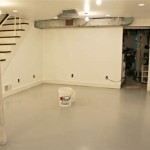```html
How Much Value Does Finishing A Basement Add To Your House?
Finishing a basement is a significant home improvement project that many homeowners consider. The primary motivation is often to expand living space, but the question of whether it adds substantial value to the property remains a crucial factor. Determining the exact return on investment (ROI) is complex and depends on a multitude of variables, including location, the quality of the renovation, local market conditions, and appraisal methods.
Generally, finishing a basement can increase a home's appraised value. However, the added value isn't typically a dollar-for-dollar match with the renovation cost. This is because appraisers often value basement square footage differently from above-grade living space. Several factors contribute to this difference, which will be explored in detail.
Factors Influencing the Added Value
Multiple elements play a critical role in determining how much value finishing a basement will add to a house. These elements can shift the perceived value by appraisers, potential buyers, and affect the overall marketability of the home.
Location and Market Conditions: Real estate is heavily influenced by location. In areas where living space is at a premium, such as densely populated urban centers or regions with limited land availability, a finished basement may command a higher return. Conversely, in areas with sprawling properties and ample above-grade space, the added value might be less significant. Local market conditions, reflecting supply and demand, influence buyer preferences and willingness to pay for finished basements.
Quality of Renovation: The quality of the finished basement directly impacts its value. A well-designed and meticulously executed renovation, featuring high-quality materials, professional workmanship, and adherence to building codes, will naturally add more value than a poorly executed or DIY project. Elements like adequate insulation, proper ventilation, and a well-thought-out layout are crucial. Avoiding shortcuts and investing in durable, aesthetically pleasing finishes can significantly enhance the perceived value.
Functionality and Design: The purpose and design of the finished basement are important. A versatile and functional space, such as a family room, home office, or in-law suite, is more likely to appeal to a broader range of buyers than a single-purpose space. Considering egress windows for safety and natural light is crucial, especially if the space is intended as a bedroom. Thoughtful design elements, such as ample storage and appropriate lighting, can enhance the usability and perceived value of the finished space.
Building Codes and Permits: Adhering to local building codes and obtaining necessary permits is essential. Failure to do so can lead to costly fines and may require the homeowner to undo unapproved work. Furthermore, a finished basement that doesn't meet code requirements may not be considered legal living space by appraisers, impacting the home's assessed value. Obtaining permits also ensures the work is inspected for safety and quality, contributing to the long-term value of the finished space.
Comparable Sales: Appraisers rely on comparable sales of similar properties in the area to determine a home's value. If comparable homes with finished basements have recently sold for a premium, it supports the argument that finishing the basement will add value. However, if comparable sales data doesn't support a significant price difference, the added value may be less pronounced. Understanding the local real estate market and recent sales trends is important when assessing the potential ROI of finishing a basement.
Appraisal Methods: Appraisers typically value basement square footage at a lower rate than above-grade square footage. The exact percentage varies depending on the market and the factors mentioned above, but it's generally in the range of 50-75% of the value of above-grade space. This difference reflects the limitations of basement space, such as limited natural light and potential moisture issues. Appraisers consider the overall quality and functionality of the finished basement when determining its contributory value.
Cost vs. Value: A Realistic Perspective
A critical aspect of assessing the value of a finished basement involves understanding the relationship between the cost of the renovation and the potential increase in property value. The goal is not necessarily to recoup 100% of the renovation cost immediately upon sale, but rather to enhance the home's marketability and overall value in the long term.
Estimating Renovation Costs: Before embarking on a basement finishing project, it's crucial to obtain accurate and detailed cost estimates from reputable contractors. Costs can vary significantly depending on the scope of the project, the materials used, and the labor rates in the area. Factors such as plumbing, electrical work, insulation, drywall, flooring, and finishing touches all contribute to the overall expense. Gathering multiple bids and comparing them carefully can help ensure a realistic budget.
Budgeting for Unexpected Expenses: It's advisable to allocate a contingency fund for unexpected expenses that may arise during the renovation process. Unexpected issues, such as hidden plumbing problems, structural repairs, or code compliance upgrades, can significantly impact the budget. A contingency fund of approximately 10-15% of the total estimated cost can provide a buffer against unforeseen challenges.
Considering Long-Term Benefits: While the immediate ROI of finishing a basement may not be a dollar-for-dollar match, it's essential to consider the long-term benefits. A finished basement can add significant living space to a home, improving the homeowner's lifestyle and increasing the overall enjoyment of the property. This added space can be particularly valuable for growing families or those who need dedicated spaces for work, hobbies, or entertainment.
Marketability and Appeal: A finished basement can significantly enhance a home's marketability and appeal to potential buyers. In a competitive real estate market, a finished basement can be a differentiating factor that attracts more interest and potentially leads to a faster sale at a higher price. Buyers often appreciate the added living space and the versatility that a finished basement provides.
Energy Efficiency: Properly insulating a basement during the finishing process can improve the home's energy efficiency, leading to lower utility bills and increased comfort. This is particularly important in regions with extreme temperatures. Energy-efficient upgrades, such as insulation and high-efficiency windows, can add value to the home and appeal to environmentally conscious buyers.
Maximizing the Value Addition
Homeowners seeking to maximize the value added by finishing a basement can take several steps to ensure a successful and financially rewarding project. Careful planning, attention to detail, and a focus on quality can contribute to a higher ROI.
Thorough Planning and Design: Investing time in thorough planning and design is crucial. This includes creating a detailed floor plan, selecting appropriate finishes, and ensuring that the design aligns with the home's overall style and architecture. Consulting with an architect or interior designer can help optimize the layout and ensure that the finished space meets the homeowner's needs and preferences.
Professional Installation: Hiring qualified and licensed contractors for key aspects of the renovation, such as plumbing, electrical work, and structural modifications, is essential. Professional installation ensures that the work is done correctly and in compliance with building codes, minimizing the risk of future problems. Experienced contractors can also provide valuable advice and insights throughout the renovation process.
Addressing Moisture Issues: Before finishing a basement, it's imperative to address any existing moisture issues. This may involve installing a drainage system, sealing cracks in the foundation, or improving ventilation. Moisture problems can lead to mold growth and structural damage, significantly reducing the value of the finished space. Addressing these issues proactively can prevent costly repairs in the future.
Focusing on Functionality: Prioritizing functionality in the design of the finished basement can enhance its appeal to potential buyers. Consider creating versatile spaces that can be used for multiple purposes, such as a family room that can also serve as a home theater or a guest bedroom that can double as a home office. Incorporating ample storage solutions can also add value and improve the usability of the finished space.
Enhancing Natural Light: Maximizing natural light in a basement can significantly improve its ambiance and perceived value. Installing larger egress windows or adding a walk-out entrance can bring more natural light into the space and make it feel less like a basement. Light wells can also be used to redirect sunlight into basement windows.
Maintaining Consistent Style: Integrating the finished basement seamlessly with the rest of the home's style and décor can enhance its overall value. Using similar flooring, paint colors, and architectural details can create a cohesive look and feel. This helps the finished basement feel like an integral part of the home rather than an afterthought.
In conclusion, finishing a basement can be a worthwhile investment that adds value to a house, provided that the renovation is well-planned, executed with quality workmanship, and aligned with local market conditions. However, homeowners should have realistic expectations about the ROI and recognize that the added value may not always equal the renovation cost. By focusing on functionality, design, and adherence to building codes, homeowners can maximize the value added by finishing their basement and create a valuable and enjoyable living space.
```
Finished Basements Ideas Costs And Added Value Explained

8 Surprising Ways To Add Value Your Home With A Finished Basement

Will A Finished Basement Add Value To My Home Columbus Real Estate Blog

Should You Finish Your Basement To Sell For More Curbio

Finished Basements Home Value Csg Renovation

Does Finishing Your Basement Add Value To Home Hertz Remodeling

How Much Does A Finished Basement Add To Home Value Vs Unfinished Hgtv

What Are The Benefits Of A Finished Basement

How Much Value Does A Finished Basement Bdd

Does A Finished Basement Add Home Value Zillow
See Also








